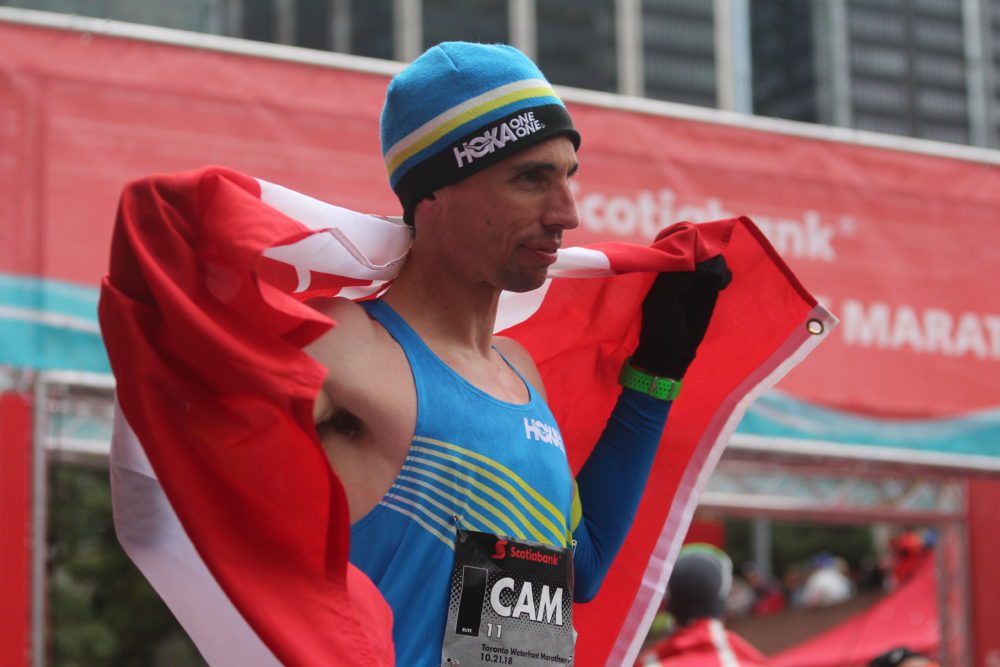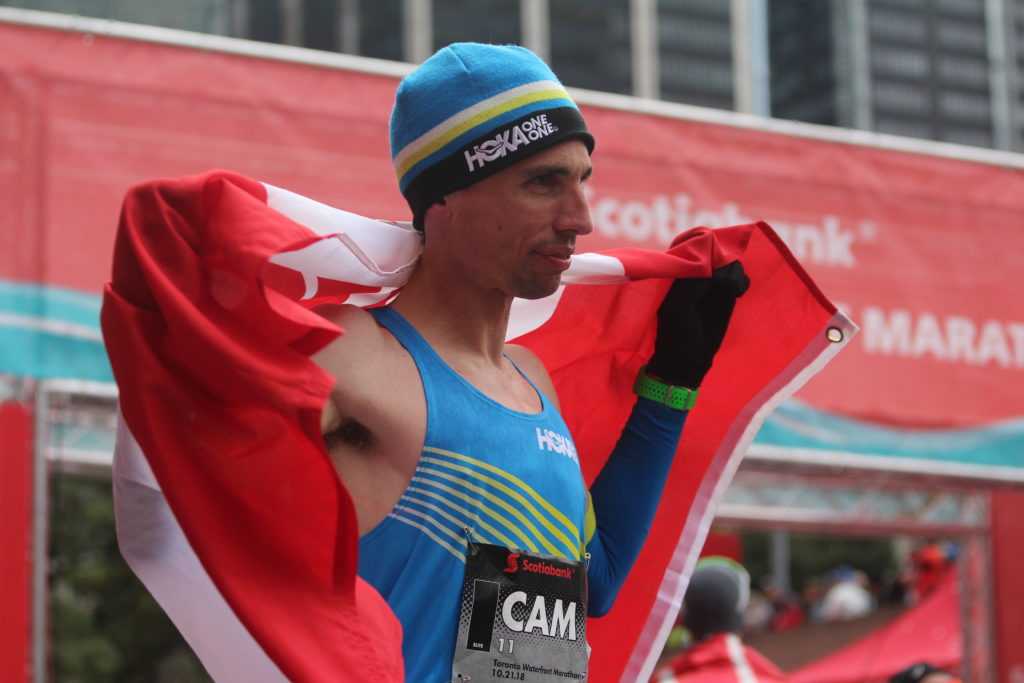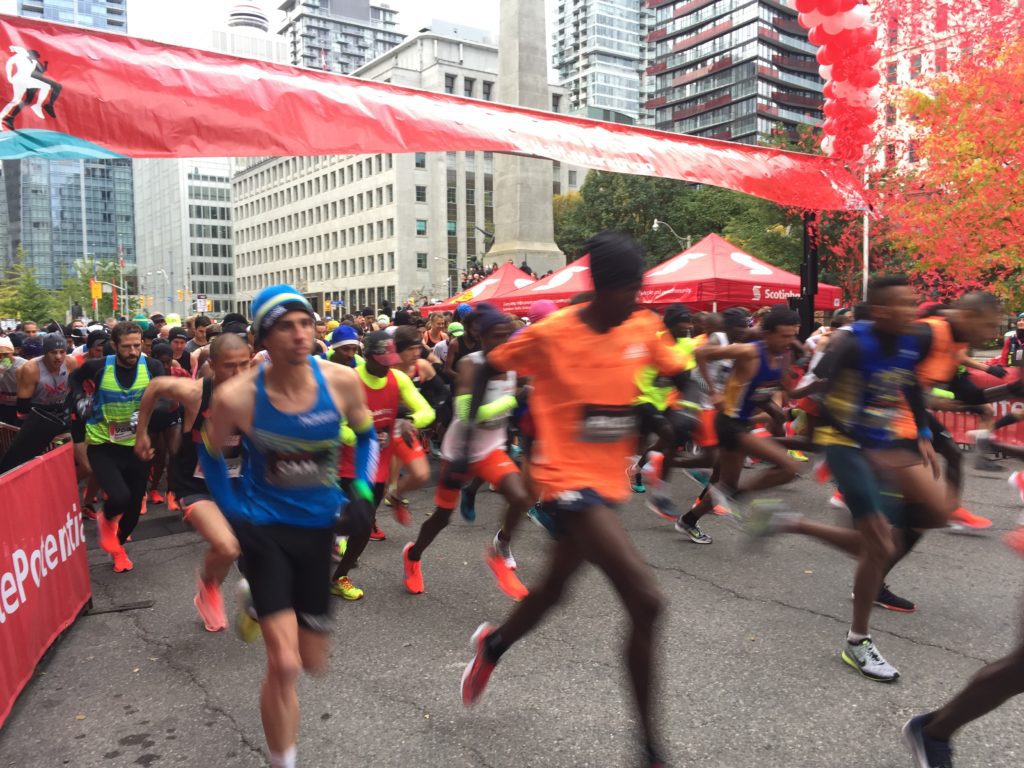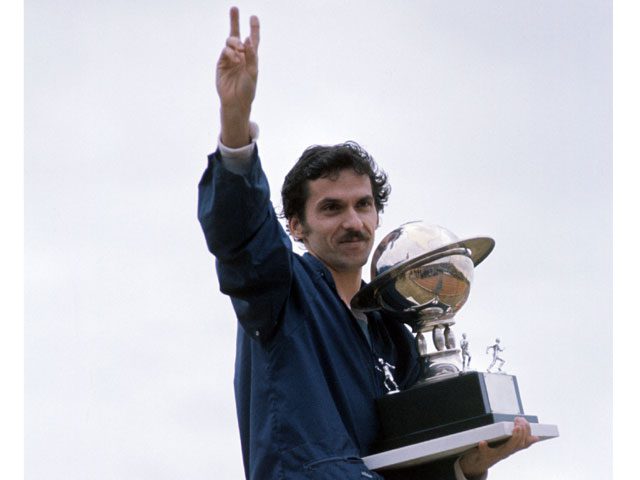Cam Levins was patient, and it paid off
Cam Levins was patient through his race on Sunday, and through many setbacks over the past three years. All of that culminated in a Canadian marathon record


On Sunday October 21, Cam Levins, 29, broke a record that has stood for many more years than he’s been alive. Levins crossed the line in his marathon debut in 2:09:25, 44 seconds ahead of the record set 43 years ago by Jerome Drayton.
Levins was patient throughout his record-setting race. The leaders went out quickly, with Jake Roberston of New Zealand looking for a massive personal best, but Levins remained in the chase pack and waited. He was at 1:04:34 through the halfway mark, and remained shockingly consistent, clicking off roughly 15-minute 5K’s for the entire race. Levins said that he knew he was in shape to run his time from yesterday: “I always believe that if I’m capable of running well, I will fulfill whatever potential that is. The result isn’t completely in my control, but executing my race perfectly and giving a full effort is.”
Levins was a very successful NCAA track runner, winning the 2012 Bowerman Award, which is awarded to the most outstanding male and female track and fields athletes of the year. This award is to track, as the Heisman Trophy is to football. Levins was presented with the award following his NCAA double-gold-medal performance in both the 5,000m and 10,000m, becoming the first to achieve that since Galen Rupp did it in 2009.
RELATED: Cam Levins breaks Canadian record at 2018 Scotiabank Toronto Waterfront Marathon

After one of the most storied NCAA track careers in history, Levins went on to make the 2012 London Olympics in the 5,000m and 10,000m. There he placed 14th, running 13:51.87 over 5,000m and 11th over 10,000m. Following the Olympics, he signed with Nike and the Nike Oregon Project in 2013. Under Alberto Salazar and NOP, Levins trained with Olympic champions Mo Farah and Matt Centrowitz and Olympic silver and bronze medallist Galen Rupp. During his time there, Levins also set the former Canadian 10,000m record of 27:07:51 (since broken by Mohammed Ahmed at the 2017 World Championships in London), and placed third at the 2014 Commonwealth Games in the 10,000m.
But Levins was plagued with a string of injuries in 2015. At the Canadian Track and Field Championships in Edmonton that year, Levins was hit in the back after his 1,500m heat. He hit the ground and was later diagnosed with a tear in the peroneal tendon in his left foot, stress fractures in navicular and talus bones, and a bone spur and bone chips. Levins had surgery in 2016, and did not make the Rio Olympic team.
RELATED: Cam Levins withdraws from Scotiabank Toronto Waterfront Half
In 2017, Levins officially left Nike and the Nike Oregon Project to return to running with his Southern Utah University coach Eric Houle. Of the world-class group of athletes in the Oregon Project, Levins told Canadian Running back in 2017, “It was great having people like that to chase. Ultimately what began to happen was that some of the guys were training more on their own and the benefit for me, especially coming back from injury, wasn’t there anymore.”
https://www.instagram.com/p/BpN8-X0hMfg/?hl=en&taken-by=camlevins
Levins ran as an unsigned athlete for several months, wearing his team Canada gear when he stepped up to the line. He won the 2017 Canadian 5K Championships, and by January of 2018, he had signed with Hoka One One. Levins ran his official half-marathon debut at Houston in January, 2018 in 1:05:00. He qualified for the Half-Marathon World Championships in Valencia, Spain in March, placing 30th there and running a personal best of 1:02:15. Levins said that there was some discussion as to whether it was worth the effort needed to gain so much fitness, strength and mobility after his injury. But he decided it was important. “I love to run, and I don’t want to walk away knowing I didn’t try my best, and was beaten outside of racing.”
RELATED: Andrea Seccafien, Cam Levins win 2017 Canadian 5K Championships
While Levins was dealing with injury, switching coaches and considering giving up professional running entirely, several other Canadian men were attempting to take down the record that stood until yesterday. Reid Coolsaet, a two-time Olympian, was the closest, running 2:10:28 at the Berlin Marathon in 2015. Eric Gillis and Dylan Wykes also came close to the mark, with three-time Olympian Gillis running a 2:11:21 at Toronto in 2014, and Wykes running a 2:10:47 at the Rotterdam Marathon in 2012. But Levins was a marked man–many speculated that if he could get healthy and give the marathon a try, he would do great things.
Drayton was once one of the strongest marathoners in the world. His 2:10:09 and win in Fukuoka, Japan at the unofficial World Championships in 1975 marked him as the best not only among Canadians, but among the world. Drayton won Fukuoka three times, as well as the 1977 Boston Marathon. He was second at the 1978 Commonwealth Games, and finished sixth in the 1976 Olympics, despite being ill. In an interview today, Drayton joked that he thought the record would fall 30 years ago, but that he’s happy for Levins’ accomplishment, “You never know what can happen in a marathon debut. I thought it would happen, but you never know with the first.” He continued, “I was concerned about the cold. I wouldn’t have lasted in that race. I always did better in the warm weather.”

Drayton had a lengthy and successful career, but records are made to be broken. What arguably made Levins an obvious candidate to break the record was his notoriously high mileage and extreme range. Levins has world-class personal bests in events ranging from the 1,500m through the marathon. For a runner to be able to maintain their speed with that kind of aerobic capacity is special. Drayton said, “I always relied on my own 5,000m and 10,000m speed in the marathon. The speed work is crucial for the last five kilometres.”
RELATED: The Shakeout Podcast: The Rookie, The Veteran and The Future of Canadian Marathoning
But Levins’ success is attributable to more than just physical talent and preparation. He’s got it figured out mentally as well. “I wasn’t always as motivated as I felt I should be, but myself, and others, helped me focus on the improvements I was making. As long as I kept moving forward with fitness that was something to appreciate.” The runner also stresses the importance of mental preparation on race day. “Staying in the process of racing and not jumping ahead to the potential result is at times overlooked, but so important.”
Levins is walking away from his marathon debut confident. And confidence is arguably one of the most important aspects of running. “Confidence is all about believing in yourself even if no one else will. Without it, you are giving up before you start.” For now, the Canadian champion will take some time to revel in his accomplishment. He’d like to do a spring marathon, but there’s nothing set in stone. Levins’ patience brought him back to running fast, and consequently, to raising the bar in Canadian marathon running. And as spectators, we’ll be patiently waiting to see what he does next.


